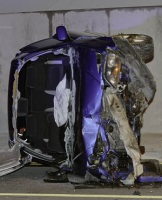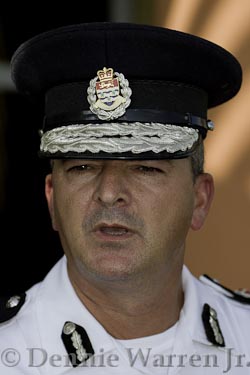Archive for September 29th, 2011

Ezzard calls for lard tax
 (CNS): With a long list of items that remain inexplicably duty free, including lard, the independent MLA for North Side has queried why government can't lift the 12% duty on medicines and medical equipment to give the country's senior citizens some, albeit minor, relief and transfer the duty to some of the many other random items on the customs tariff. Government voted “no” to a private members motion brought by Ezzard Miller on Thursday asking for the duty relief, stating that it was considering a range of measures on how to make health care cheaper for all but it could not just cut government revenue streams without replacing it from somewhere else.
(CNS): With a long list of items that remain inexplicably duty free, including lard, the independent MLA for North Side has queried why government can't lift the 12% duty on medicines and medical equipment to give the country's senior citizens some, albeit minor, relief and transfer the duty to some of the many other random items on the customs tariff. Government voted “no” to a private members motion brought by Ezzard Miller on Thursday asking for the duty relief, stating that it was considering a range of measures on how to make health care cheaper for all but it could not just cut government revenue streams without replacing it from somewhere else.
Miller pointed to the irony that lard, one of the most unhealthy products people could consume, was tax free while most medicines carried a duty. He said there was a long list of items in the customs tariff law 2010 that remained duty free that could very easily be taxed to raise the $3 million which government would expect to receive in the financial year from medicines and medical supplies. As well as lard, Miller listed binoculars, chickens, trees and plants, telescopes, wool, pearls, gold bullion, pets, jewellery cases, radios, tractors and a multitude of other goods that were duty free that could be taxed to raise the missing revenue.
Miler said that government should be using the custom's tariff as a way of manipulating healthy behaviour, but when lard was duty free and medicines were rated at 12% there was something wrong. The independent member's motion was defeated but not before he had noted the idiocy of the customs tariff. He pointed to only four things which were excluded from duty relating to medicines and medical equipment: insulin, vaccines, wheelchairs and appliances for the severely disabled.
Miller said that for many of his constituents who were pensioners on fixed income, taking the duty off their medicines would offer a small relief as many did not get assistance from government. He suggested that “political patronage was rampant” when it came to benefits from government and who got free health care and who did not. He pointed to three of his constituents who had applied to CINICO recently who had been refused despite their need because of the subjectivity that surrounds who gets benefits and who doesn't.
Miller said the amount he was asking for was not so great, especially when there were many other items that did not need to be duty free, but the small amount of reduction in the cost of medicines could make a genuine difference to many of the country's seniors.
The motion was seconded by the member for East End, who also represents a number of elderly constituents, and he said government was recently bragging about its $25 million surplus and having turned the economy around when so many people were still suffering. Arden McLean said it was particularly difficult for the elderly to survive and they were, unlike in other countries, given very few breaks or discounts in Cayman. He said that having grey hair here seemed to be a signal to some people that they had money, which was not always the case.
“I implore the government to look for some way for seniors to get exemptions,” he said suggesting that pharmacies could be trusted to submit records of the refunds given to the elderly only if government was not going to support a removal of the duty across the board. He spoke about how the Legislative Assembly had voted to give away millions of dollars in duty concessions on Wednesday to the Cayman Enterprise City but government could not give a 12% duty reduction to the country's elderly.
Health Minster Mark Scotland argued that government had already formed a committee that was examining health costs across the board and was looking to reduce all elements of health care, making it more affordable for everyone. He also pointed out that many elderly people and seniors already accessed health care and drugs for free via the Health Services Authority or were covered by CINICO. Furthermore, he said that the Shetty Hospital would provide future reductions in health care for all of Cayman's elderly patients and would provide quality care while cutting costs to government. Scotland said there were numerous ways that government was helping to lower the cost of health for everyone and would carry on examining areas where reductions could be made.
The premier stated that throughout his political career he had wanted to reduce duty on many things but right now he no longer controlled the budget because of the pressure from the UK. He said that the FCO had already told him that if he was going to give the 3.2% cost of living allowance backto civil servants, he would have to find that somewhere else.
Bush also pointed to the extremely high bills government faced for health care, which were rising, and he indicated that this year it would likely have to wipe out bad debt atthe hospital that had amounted to more than $12 million because local people could not pay and would probably never be able to pay.
He said that government wished it was in a position to agree to the motion but, given the situation, it was not possible at the moment. Bush maintained that the health minister was working hard to reduce everyone's health care costs. He said he was an all fours with the opposition bench over the issue and he wanted to see health costs cut for everyone.

Keep kids with chickenpox home, public health asks

The chickenpox vaccine has been part of the local immunization schedule since 2000, and children in the Cayman Islands are generally immunized against chickenpox at the age of twelve months.
“The public need not be alarmed as about 75 – 100 cases are reported annually in the Cayman Islands with fluctuations. As of this month, there have already been 52 reported cases with half of them in children under the age of 15. This is a sharp rise from last year’s total of 29 cases but still far less than the 104 cases reported for 2009.
“There will be many more unreported cases. People who had chickenpox already will have natural immunization. However, for persons who have not had chickenpox, we recommend that you get vaccinated,” Dr Kumar noted.
Vaccinations are available at the General Practice Clinic, at the Cayman Islands Hospital on Saturday 1 October, 2011 between 9:00 am and 3:00pm (no appointments necessary). As usual, parents can have their children immunized at any district Health Centre or Public Health Clinic.
For more information, contact the Public Health Department on 244–2648.

Speeding driver injured in early morning crash
 (CNS): A 20-year-old man was injured in a single-car accident around midnight Wednesday night/Thursday morning near Cayman National Bank on Elgin Avenue in George Town. Police say the male driver lost control of the motor car while travelling east along Elgin Avenue at a high rate of speed and it is suspected that alcohol also played a role in the accident. The driver sustained serious injuries and is being treated at the George Town Hospital. However, the sole passenger received no serious injuries. The matter is under investigation be the RCIPS. (Photo by Dennie Warren Jr)
(CNS): A 20-year-old man was injured in a single-car accident around midnight Wednesday night/Thursday morning near Cayman National Bank on Elgin Avenue in George Town. Police say the male driver lost control of the motor car while travelling east along Elgin Avenue at a high rate of speed and it is suspected that alcohol also played a role in the accident. The driver sustained serious injuries and is being treated at the George Town Hospital. However, the sole passenger received no serious injuries. The matter is under investigation be the RCIPS. (Photo by Dennie Warren Jr)
Anyone who has any information about the crash should call the RCIPS Traffic Management Unit at 946 6254 or any police station within the Cayman Islands.

Police ID 13 local gangs
 (CNS): The police commissioner said several gang members had been arrested and released on electronic tags over the last week in relation to this month’s killing spree. Following the five murders over an eight day period, suspects police believe are associated with the gangs are being arrested, questioned and processed under gang legislation, which allows officials to hold them for around three days. David Baines said police have been able to identify 13 separate gangs that have alliances beyond the gang lines and can be quite transient. He estimated that between the two main West Bay gangs – Logwoods and Birchtree Hill – there were around 50 members but only a few of them were the “toxic individuals” responsible for the killings. (Photo Dennie Warren Jr)
(CNS): The police commissioner said several gang members had been arrested and released on electronic tags over the last week in relation to this month’s killing spree. Following the five murders over an eight day period, suspects police believe are associated with the gangs are being arrested, questioned and processed under gang legislation, which allows officials to hold them for around three days. David Baines said police have been able to identify 13 separate gangs that have alliances beyond the gang lines and can be quite transient. He estimated that between the two main West Bay gangs – Logwoods and Birchtree Hill – there were around 50 members but only a few of them were the “toxic individuals” responsible for the killings. (Photo Dennie Warren Jr)
Answering questions posed by members of the business community at a special Chamber of Commerce crime meeting on Tuesday evening, he explained what the police have been able to piece together about the gangs that are operating in Cayman.
He said police believe it is the gangs that are responsible for many of the robberies that have been taking place, as well as other criminality, but not all of the members were what he described as the triggermen willing to kill. He said in the fourth murder of the year, the van in which two men were shot off Crewe Road was connected to the Tortuga Robbery in Passadora Place. Baines said he believed some of the gangs were involved in the more sophisticated bank robberies, while others the more opportunistic hits on grocery stores.
When the commissioner spoke about 15 individuals in 2009, he explained, he had been referring to the triggermen who were the ones in the gangs willing to use extreme violence to shoot at opposite gangs and to take lives without thinking about it.
Baines said police believed that two of those 15 have now gone overseas, three have been shot and killed by the opposing gang and the others were arrested and sent to Northward, some of whom remain there while others have come out . Since then, the senior officer revealed, some others who weren’t free at that time have been released from Northward, adding to the number of “toxic individuals capable of that level of violence” and other members have emerged to take up the role of gunmen.
He said that the police believe gang activity goes back about fourteen years, when there were two distinct gangs with “notorious individuals at the head of each them … which was a power control for an area,” but he explained there were now around 13 gangs that had alliances beyond the distinctive district gang.
The commissioner said that most of the murders in 2009 to 2010 as well as three ofthe recent five murders were related to the long running dispute that exists between the West Bay gangs of Logwoods and Birch Tree Hill. “The dispute there was based on geography and familial ties and there have been fall outs over property and girlfriends and it has escalated to extreme violence,” Baines added.
He said not all of the members of these two gangs were gunmen; some were enforcers, others were runners and they range from as youngas 16 to the older members in their late thirties. Between them there are around 35 on one side and only 15 or 16 on the other. Added to the West Bay gangs were gangs operating in Bodden Town, George Town and East End that were allied with gangs in West Bay.
He also explained that membership is fluid and that in some cases members move across gang lines or there is a split within one gang because of dispute over the spoils of crime or some other fall out. “There is a shifting number of transient people who go from one gang to another,” he said, adding that the police are monitoring all of these individuals as well as the areas they are coming from.
Baines explained that there are specific neighbourhoods in Cayman where these groups operate in numbers, where criminality is part of a lifestyle and where they tolerate each other and no one there is involved in what he described as normal life like the rest of us. He said they are unemployed and excluded from mainstream society and, as the education minister revealed recently, all five of the murder victims this month were products of the Alternative Education Centre.
Living in a criminal environment, these young people were involved in low level criminality and some of them had escalated to using extreme violence and firearms at a very young age, Baines said.
The commissioner said that officers from Uniform Support and other units were now engaged in the dangerous work of dealing with the suspected triggermen on the front line, going into their homes and neighbourhoods where the police were not welcome and arresting them, as well as looking for evidence of their involvement in the shootings.

Pressure on the good eggs
I was given permission to repost this comment as a viewpoint as I think it is indicative of the pressures young Caymanians face from their families, visitors and the global community to be the cause for growth and change among our islands. We have made the right steps in making a positive difference in our own lives, our families lives and for our community. We are educated and, instead of remaining abroad like several of our counterparts, we have returned home to a country much-changed.
We recognise the opportunities given to us and how unique these are and we have been and continue to be up to the task in taking advantage of them. We give back to our communities and are involved in several organisations aiming to be proactive (many of us NOT in the YUDP or Young Progressives). I want other Caymanians to contribute to this discussion to prove that we do exist; that we share the same sentiment; and that we are here to better our country as a whole — politics and nationality and racial issues put aside. I want those who have suggestions on how to deal with mentioned pressures to make them and I want those who aren't necessarily familiar with the islands and our history to ask questions. It is clear that we all need to come together to make the change and it is not going to be as quick and painless as we all would hope. I am hoping this discussion will make you stop and think before complaining or critisizing in future discussions and comments. Thank you!
__________________
I am working with a global company of roughly 60 persons. Aside from myself there are two other Caymanians who are not administrative staff. Only 6 other Caymanians, in total, work in the office and they are all close to 50 years old and remain admins after 10+ years with the company. I overheard one of my superiors claim that Caymanians are dedicated and loyal to their jobs but have no desire to better themselves, which hurt to hear but, for the most part, is true. Many of them have been offered schooling in order to receive promotions and they have refused. To you I say, "give up the ignorance and the deserving attitude and pick up a book."
To the expats — you're some of my best friends, in and outside of the office, and I am grateful for your contribution to our backward society but, as a young Caymanian who HAS made all of the right decisions, I am offended by some of the comments posted on this website and by some of the arguments fueling discussions 'at the watercooler'. While there is a reason to develop the stereotype of the Caymanian mentality, those of us trying desperately hard to make changes are still young and figuring out how to deal with the extremely rapid changes our country has faced in the past three decades. We'll make it there, but such harsh comments only intimidate those of us who are still trying to make it on our own, while cheating the system we've been held down by. Remember this — sometimes we want to escape as well, but are held here by accountability and community, so threatening us of your swift departure does not really send any shock value into the discussion.
Our economy was exploding and self-sustaining for a few short decades, thanks only to outside influence of course, and our foolish government really never had any responsibilty or accountabilty in the past so our community did not realise such a drastic need for change until the global economic problems swung the basket cap on the dirty laundry wide open … and then the crime came.
Believe me, there are Caymanians who are embarrassed by our government, by OUR ignorance and even by some family members. But isn't this the case for any nation to some extent? We are tiny and are so dependent on each other. We are also completely dependent on the investments from other nations to keep our economy running and it scares a lot of people to think, 'we need help so badly that the Caymanian population makes up less than half of the nation.' Please understand how it is difficult to some (and remember: they're not as educated or exposed to other societies) who feel like they're losing our country.
Like many countries, we are still developing. My father, in his 60's, was one of less than 10,000 inhabitants on-island, which proves how young of a nation we are. He was a part of a generation (ONE generation ago) who had to do manual labor, out of necessity not choice. He went to sea for months at a time with the other Caymanian men, while their women waited for their return. Our culture is not a joke — it is real and there is nothing we can do to change it, regardless of how tough it may or may not have been and regardless of how uninteresting you find this to be. Because financial institutions, zero crime rate (not too long ago) and our high standard of living has put us on the map, does not mean we are not vulnerable to the problems that other developing countries face and it does not mean we can rank ourselves among the nations from which most of our residents come from, so please do not let your judgments reflect expectations of anything more. If you want to see change, become a part of it. We cannot do this alone.
I am a 26 year old Caymanian with an MBA and a CPA and to everyone reading, be patient … the next generation is coming and I promise, there is PROMISE here.

CS pension liability growing
 (CNS): The government has paid nothing into the growing pension liability it faces for civil servants who will be expecting a fixed pension based on their earnings when they retire, the Legislative Assembly heard on Wednesday. Answering questions from the opposition, the premier said that since taking office there had been no money to pay against the pension, despite the warnings issued by the 2009 Miller-Shaw Report and the Office of the Auditor Generals about the size of the liability, which is over US$324 million. The premier also revealed that no health fund had been established to address the government’s future liability for health care costs for retired civil servants, which is estimated to be over US$798 million.
(CNS): The government has paid nothing into the growing pension liability it faces for civil servants who will be expecting a fixed pension based on their earnings when they retire, the Legislative Assembly heard on Wednesday. Answering questions from the opposition, the premier said that since taking office there had been no money to pay against the pension, despite the warnings issued by the 2009 Miller-Shaw Report and the Office of the Auditor Generals about the size of the liability, which is over US$324 million. The premier also revealed that no health fund had been established to address the government’s future liability for health care costs for retired civil servants, which is estimated to be over US$798 million.
The question of government’s growing contingent liabilities saw the premier and the opposition leader clash across the floor of the chamber when legislators returned to the country’s parliament and it was revealed that nothing had been paid towards any of government contingent liabilities since the UDP took office, despite having a $25 million surplus this year. Bush said that current pension payments were being made but the government was in no position to address the future liability.
It emerged that during the PPM’s administration more than $58 million had been paid into the pension fund to address that liability, which stood at $324 milllion in 2009, including during the last budget which returned the deficit of around $80 million.
Since then, no further payments have been made. McKeeva Bush said that his government would begin to pay money in when the public finances improved, as he railed against the opposition leader, saying that he could not pay in because there was no money because of the PPM’s irresponsibility and they would not admit they had left the economy in shambles. He also claimed that, given the size of the liability, even if they had matched the PPM’s payments, the liability would be hardly reduced.
McLaughlin pointed out, however, that the PPM had included some $14.5 million in payments towards the growing future liability in each and every financial year of their administration and noted that had they not put that in their budget, perhaps they could have claimed a surplus in their final year in office in the way the premier had done for the most recent financial year.
In the Miller-Shaw report, the authors had pointed out that the government had a number of serious and growing contingent liabilities that had to be addressed. The implications of the liability, the report said, were considerable. “A liability has been incurred which future generations will increasingly have to meet in cash terms for which an inadequate provision has been made,” Miller and Shaw wrote, adding that it needed to be addressed urgently.
The government also has an estimated liability of around US$798 million in regards future health care for civil servants when they retire, and the authors of the report said this was another pressing issue that government had to address and also noted that government guaranteed loans taken by out by statutory authorities amounted to around CI$142 million. Bush said he was not concerned about the loan guarantees as there was no likelihood of any of the authorities defaulting on the money they owed.
Speaking about the wider recommendations in the Miller-Shaw report, which was commissioned in 2009 to assist the government in generating new revenue and cutting expenditure, Bush said of the twelve main recommendations his government had followed six of them, which included not introducing direct taxation.
The premier said he had reduced operational expenditure by cutting civil service costs, he had completed all the audits of government departments, the ESO was working on improving the accuracy and frequency of statistics, andthe plans for the Shetty hospital, Cayman Enterprise City and the Dart Alliance were examples of attracting private capital, as recommended in the report. Bush further claimed that he was implementing the recommendation to diversify or privatize government assets.
Although nothing has yet been sold, he said the sewage works was still going through the tendering process and it would be divested before the end of the year. Bush gave no further details of the process but CNS understands that the sewage bid is now on its third round after several changes and to the technical committees, conflicts of interest and various other issues that seem to have plagued the process. The technical committee had reportedly made a recommendation after the second time around examining bids of a locally formed company, just a few weeks ago, but it is understood that the recommended firm was not accepted and the process was started again.
Other attempts by the government to sell assets, including the GOAB and the Water Authority itself, were halted as a result of the level of opposition in the community.
The Miller-Shaw report was commissioned in 2009 and completed in February 2010 and it recommended a number of actions government could take to improve revenue and reduce costs. It also spoke about lower work-permit fees and in particular reducing the civil service head count and operational expenses.

Info boss urges top civil servants to embrace FOI
 (CNS): Although there is now more support in government for the Freedom of Information law the information commissioner has said there is a need for more senior civil servants to embrace the law and support their information managers. Speaking at a special presentation marking international Right to Know Day, Wednesday, Jennifer Dilbert said it was time that all public authorities took the issue on board and “get with the programme” as FOI was here to stay. She commended some authorities for the way they had begun to embrace the concept of making information accessible in particular the HSA.
(CNS): Although there is now more support in government for the Freedom of Information law the information commissioner has said there is a need for more senior civil servants to embrace the law and support their information managers. Speaking at a special presentation marking international Right to Know Day, Wednesday, Jennifer Dilbert said it was time that all public authorities took the issue on board and “get with the programme” as FOI was here to stay. She commended some authorities for the way they had begun to embrace the concept of making information accessible in particular the HSA.
Dilbert also revealed that three years on the people had really embraced the legislation and were exercising their right to know. This public engagement with the law by was confirmed in figures revealed by Dilbert’s deputy Jan Liebaers who said on a per capita basis Cayman made some of the highest number of requests in the world.
While that might be a good thing on the one hand as people were clearly exercising their right under the law, on the other hand they might be using the law so much because not enough information is in the public domain.
In a report created for Right to Know week Liebears presented the statistics so far based on the information logged into the government’s tracking system known as JADE. He said however, that the information is not always logged in, or logged correctly by information managers so the figures he had been able to put together were an underestimation of the number of requests that have actually been made.
He said at least 1795 requests have been made since the law came into effect in January 2009. After an initial early surge of applications in the first few months of the law’s implementation as people sought to access information they may have wanted for sometime or requested important personal information, requests have stabilized.
Although applicants are anonymous Liebaers said email addresses reveal that FOI frequent flyers are the press, community activists and lawyers. Government expenditure, minutes of board meetings and personal information are the most frequent types of requests made. Immigration, the police, legal affairs and the HSA are the four public authorities who have dealt with the highest number of FOI applications. Since the law was implemented Immigration has dealt with 290 requests.
Only 37% of all FOI requests resulted in full disclosure. Liebaers statistics show that a further 13% have been granted in part, in more than a quarter of cases the public authorities applied an exemption or an exclusion in 12% of cases no records were found, 1% were deferred and the remaining 10 percent were closed administratively.
Of the fifteen hearings that have come before the commissioner seven have gone in favour of the public authority and five in favour of the applicant, while two resulted in partial disclosure and one was withdrawn by the applicant.
During the presentation Dilbert said the law was working and it was effective from both sides as it protected sensitive information when necessary and allowed public access when it wasn’t. She urged senior civil servants to embrace the law and support their information managers as she said the main complaint from them was they didn’t always get the support they need or access to the records to do their job. Dilbert warned that the law requires IMs to be given the resources and support they need.
She said that the ICO had submitted its recommendations to fine tune the law to the legislative review committee and was now waiting on their response. She said progress on the review of the law was slower than she liked but she believed that the committee were addressingthe issue soon.
Governor Duncan Taylor also offered his support for the law at the presentation and said he believed it made civil servants more responsible and thoughtful about spending public money when they knew the figures could be made public.
He told civil servants to think when they spent money on travel or a conference how would it look when it was written about in the media. He called it the “Daily Mail” test after the well known UK daily newspaper. In Cayman he said civil servants could apply the “Compass or CNS” test to help them think sensibly about what they were doing. “There is nothing like knowing that it is going to be public,” to make people be more reasonable and spend money legitimately, the governor said. “When you are spending money on a trip would you feel comfortable with it in the news?”
He spoke about the need to proactively make as much information as possible public on government websites as the more information was available the fewer questions there would be. Taylor revealed that he would be posting the details of the running cost for Government House, the governor’s residence on Seven Mile Beach, on the governor’s office website as he said people should know how much was spent by the governor entertaining or on electricity.

Minister urges people to protect their hearts
 (CNS): With heart disease responsible for over one third of deaths each year in the Cayman Islands, the health minister has urged the community to be proactive in protecting their own and their family’s heart health to save lives. In his message for this year’s World Heart day (Thursday 29 September) Mark Scotland said premature deaths due to cardiovascular disease can be prevented when people take charge of their own risks by choosing healthy foods, doing more physical activity, stopping smoking, reducing alcohol and knowing their numbers.
(CNS): With heart disease responsible for over one third of deaths each year in the Cayman Islands, the health minister has urged the community to be proactive in protecting their own and their family’s heart health to save lives. In his message for this year’s World Heart day (Thursday 29 September) Mark Scotland said premature deaths due to cardiovascular disease can be prevented when people take charge of their own risks by choosing healthy foods, doing more physical activity, stopping smoking, reducing alcohol and knowing their numbers.
See minister's full message below

Cayman could get UK lottery money
 (CNS): The Cayman Islands government may well be in line for a cash injection from the UK, according to an article in Bermuda’s Royal Gazette. UK Foreign Office minister Henry Bellingham, who was in Bermuda launching consultation on the UK government’s new Overseas Territories White Paper, told a pressconference at Bermuda’s Government House yesterday that it seemed “quite wrong and anomalous” for Britain’s 14 Overseas Territories not to enjoy the fruits of the UK’s National Lottery.
(CNS): The Cayman Islands government may well be in line for a cash injection from the UK, according to an article in Bermuda’s Royal Gazette. UK Foreign Office minister Henry Bellingham, who was in Bermuda launching consultation on the UK government’s new Overseas Territories White Paper, told a pressconference at Bermuda’s Government House yesterday that it seemed “quite wrong and anomalous” for Britain’s 14 Overseas Territories not to enjoy the fruits of the UK’s National Lottery.
The UK lottery, he said, raised a vast amount of money and paid out billions of pounds but was not allowed to dispense money for good causes in the Overseas Territories. According to the article, Bellingham said that Overseas Territories (such as Bermuda and the Cayman Islands) had ninety five percent of Britain’s biodiversity, good justification for receipt of lottery money.
Bellingham said there was a “complete illogicality” about not having the money available for the territories’ citizens and that it seemed “grossly unfair” to withhold it from those with British passports who wish to retain links with the UK.
“It seems to me quite wrong and anomalous that they can’t enjoy the benefits of the lottery fund,” he is quoted in the article.
The article went on to say the Conservative MP planned to meet with the bodies responsible for dishing out lottery cash as a “priority”.
The National Lottery has generated more than £26 billion for good causes in the UK, with the money going toward numerous sports, arts and heritage schemes, as well as health, education and environment charities.Visit www.national-lottery.co.uk for more information.